Dirleton Kirk
Dirleton Kirk is situated to the north of the village green in Dirleton, in East Lothian, Scotland. Dirleton village lies on the south shore of the Firth of Forth 21 miles east of Edinburgh and two miles west of North Berwick on the A198 road. The church is at grid reference NT512842.
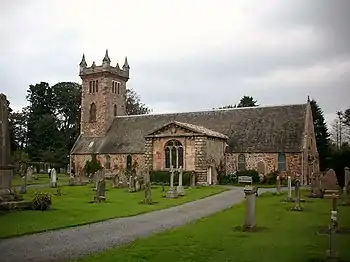
Early Christianity in the Parish now known as Dirleton
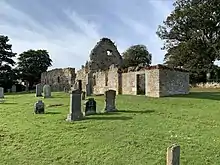
Before 1612, the parish church was the 12th century St. Andrews Church at Gullane, or Golyn as it was then named.[1] A cell of Cistercian nuns was believed to be active near the old church at Gullane in the 12th century while another house of cistercians was founded at the lost village of Eldbottle. The ancient house of Congalton founded a chapel at Congalton in the 12th century for the 'ease of their family and others who lived there'.[2] Also in the 12th century, a religious establishment was founded at Fidra, an island off Dirleton; that chapel or priory was dedicated to St. Nicholas. The monks travelled to and from the island via a ferry, and a nearby farm is still known as the Ferrygate.[3]
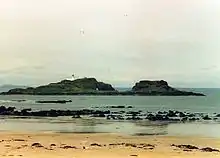
Around the same time, The de Vaux family founded a chapel, dedicated to All Saints, in Dirleton.[4][5] Then, in 1444, the Haliburton's, now the lords of Dirleton Castle founded a college of priests[6] at their church in Dirleton.[7] The old church at Gullane continued beyond the Reformation but in 1612, after a plea from Sir Thomas Erskine, a future earl of Kellie, to Parliament, the parish church was removed to Dirleton after stating his case of the old church was no longer fit for purpose because of its exposure to the blowing sands of the nearby beach.[8] In 1576, Andrew McGhie, the last vicar at Gullane St. Andrews was reproved by King James VI for his excessive use of tobacco.[4][8]
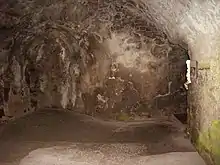
The new church
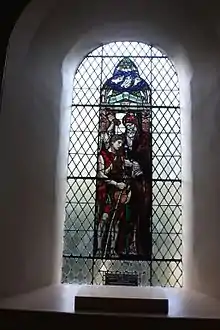
Dirleton Parish Church, dedicated to St.Andrew,[9] was built soon after Sir Thomas' plea of 1612. Colin McWilliam describes the church
"It is long and wide, with round–headed windows under the low eaves. The s side and roof are interrupted by the pedimented aisle built of ashlar by James Maxwell, Earl of Dirleton. It has a stone roof nicely supported along the eaves by stone brackets, and between the rusticated corner piers a looped–traceried window. On the e side, a pedimented doorway"[10]
Over the years the church was altered and enlarged and the Archerfield, or Dirleton Aisle was built over the grave of James Maxwell, 1st Earl of Dirletoun. This aisle is believed to be the first piece of neo-classical architecture in Scotland.[8] In 1836, the tower was crowned with Gothic pinnacles allowing the parapets of the tower to blend charmingly with the rest of the church.[11]
Mary Nisbet Hamilton (1777–1855) did much for the church. It was she who financed the building of the new manse in 1828, ensured the tower was completed and added a vestry. By way of a memorial to his wife, Mr. Russell of Archerfield donated a stained glass window showing 'St. Francis and the animals' on which more than ninety animals are depicted. Miss Margaret Chilton was the designer.
Remarkably, the church records date from 1655 and there have only been twenty ministers in the parish since 1576.[8]
In 1971 the church was designated as a Category A listed building.[12]
Pre 20th. century ministers and year of taking office
Taken from the Fasti Ecclesiae Scoticanae by Hew Scott.
- 1576 Thomas MakGhie
- 1597 Andrew MakGhie
- 1637 John Trotter
- 1639 John MakGhie
- 1683 Robert Sinclair
- 1688 Laurence Charteris
- 1697 James Clark
- 1708 James Alston ^^
- 1733 James Glen
- 1749 Hugh (or Hew) Bannatyne
- 1769 Alexander Glen
- 1805 William Stark
- 1835 John Ainslie
- 1843 James Scott
- 1864 William Logie
- 1878 John Kerr: the sporting parson.
^^ James Alston was elected Moderator of the General Assembly of the Church of Scotland in 1725.
Today
The parish now consists of Dirleton, Fenton Barns, Archerfield, the Westerdunes district of North Berwick and the hamlet of Kingston. The church has been linked with the Abbey Church (Church of Scotland) in North Berwick since 1989 and the present minister is Dr. David Graham.[13]
Notable people: Dirleton Kirk
- Sir Thomas Erskine. Lord Dirleton
- Sir James Maxwell of Dirleton
- Sir John Nisbet, Lord Advocate – A man described by Bishop Gilbert Burnet as:
"One of the worthiest and learnedest men of his age, a person of great integrity and who always stood firm to the law"[4]
- Mary Nisbet Hamilton
- Mr. Jackson Russell of Archerfield
References
- "Archived copy". Archived from the original on 4 May 2009. Retrieved 25 October 2009.CS1 maint: archived copy as title (link) Church of Scotland, Abbey Church, North Berwick – History of Dirleton Church
- http://stat-acc-scot.edina.ac.uk/sas/sas/.asp?action=public%5B%5D Statistical Account of Scotland. 1834–1845
- http://dirleton.totallyexplained.com/%5B%5D Dirleton Totally Explained website
- "Archived copy". Archived from the original on 18 May 2015. Retrieved 9 May 2015.CS1 maint: archived copy as title (link) Statistical Account of Scotland 1834–1845
- http://www.arts.gla.ac.uk/scottishstudies/charters/de%20Vaux%20family.pdf Archived 2011-06-07 at the Wayback Machine Notes on the de Vaux lords of Dirleton by Matthew Hammond
- http://www.northberwick.org.uk/dirleton.html Dirleton Village by Douglas Seaton
- http://undiscoveredscotland.co.uk/dirleton/dirletoncastle/ Undiscovered Scotland – Dirleton Castle
- "Archived copy". Archived from the original on 4 May 2009. Retrieved 25 October 2009.CS1 maint: archived copy as title (link) Dirleton Church History page
- https://archive.org/details/fastiecclesiscot01scotuoft Fasti Ecclesiae Scoticane, The succession of ministers in Church of Scotland from the Reformation by Hew Scott
- The Buildings of Lothian Except Edinburgh by Colin McWilliam. ISBN 0-14-071066-3
- The Buildings of Lothian except Edinburgh by Colin McWilliam. ISBN 0-14-071066-3.
- Historic Environment Scotland. "DIRLETON VILLAGE, DIRLETON PARISH CHURCH, GATEWAY AND GRAVEYARD WALLS (Category A Listed Building) (LB1526)". Retrieved 14 March 2019.
- http://www.abbeychurch.co.uk/ Abbey Church, North Berwick